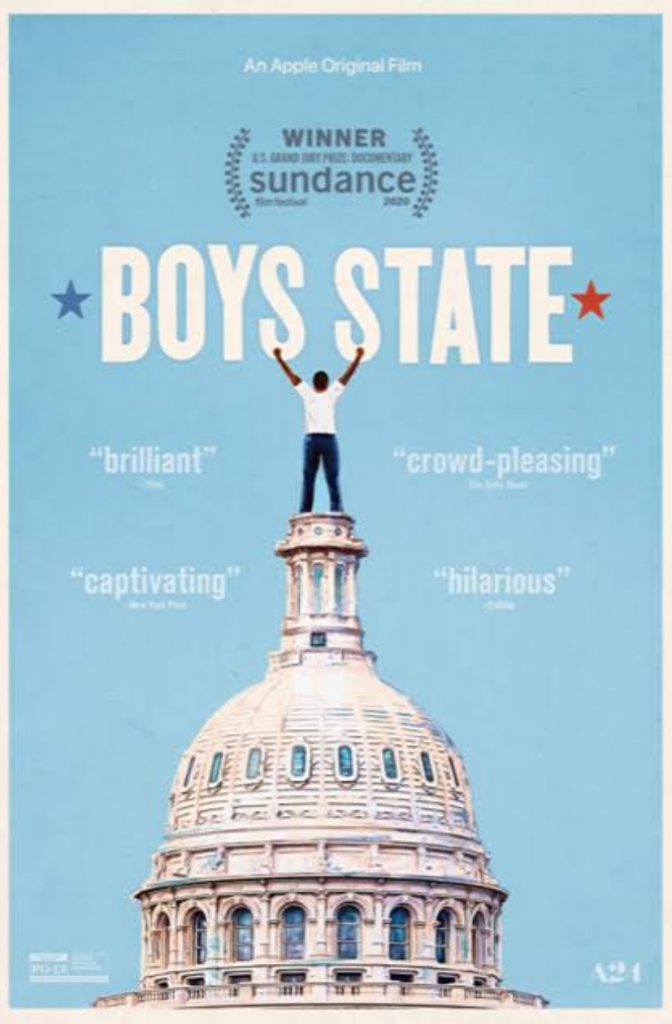By Gary Kramer–

The new documentary Boys State, directed by Amanda McBaine and Jesse Moss, is as ambitious as the young men the filmmakers follow. Four teenagers in Texas are profiled as they participate in Boys State, a week-long experiment in self-government and civil discourse sponsored annually by the American Legion. The film, available August 14 on Apple TV+, is a mix of observational footage and interviews that provides a sense of these young men and their political aspirations. It is only occasionally inspiring.
Boys State introduces Ben, a double amputee who has a Reagan doll and a passion for speechwriting; Steven, a progressive Mexican in a largely conservative space; Robert, a good ol’ boy who is very pro-gun; and René, an African American who has charisma to burn. Ben is on the Federalist side; René is elected State Party Chairman for the Nationalist side. Robert and Steven become Nationalist candidates for Governor, the highest position in the Boys State government.

As McBaine and Moss chronicle the events and days leading up to the big election, there are bills to be legislated and party positions to be decided and declared. Some of the proposals are quite ridiculous—there are multiple calls for secession—showing that hundreds of teenage boys can be a bit silly at times. For viewers who wonder why the filmmakers did not make “Girls State” (a parallel program) to show what female leadership looks like—or could look like—that documentary, which might have more political relevance, is, reportedly, in the works.
While there are scenes of Robert and Steven racing to get signatures to get on the gubernatorial ballot, the documentary never fully engages until Steven gives his first speech, a rousing story that shows his humility and sincerity. Steven suddenly becomes someone to watch and care about; meanwhile, René is facing a call for impeachment.
Boys State shows the strategizing each party does to find a platform, and while some of the debate scenes show the party disunity—at one session a question is raised about debating about what to debate—the filmmakers give too quick a glimpse at the process. Instead, they spend considerable time on a montage of unfamiliar teens auditioning for the Boys State talent show. Selections from the talent show itself, shown later in the film also seem wasteful. These scenes act as filler, but they fail to build dramatic tension, or serve as a suitable breather between more intense moments.
The film does actually become interesting when one of the four teens profiled has an insight, claiming that his personal views do not align with the politics he is espousing publicly. He acknowledges that he cannot win an election with his minority opinion; it will cost him votes. While he finds it morally questionable to lie, he does it, realizing that politicians do this too. It’s a strong scene, because it shows the impact the Boys State program has on teaching these teens critical thinking and real-life situations. The film should have more moments like this. Another fine scene that occurs late in the film has René describing one of his colleagues as “a fantastic politician,” before qualifying his statement with, “That is not a compliment.” René also handles the teens wanting to impeach him with his stinging wit.

Boys State is best, however, when it follows Steven, who deserves a film of his own. The young man is inspiring to his constituents, acting as a voice of reason who really understands the system and wants to make it work. In comparison, Ben, who is whip smart, sees Boys State as a game and plays to win by any means necessary.
Steven’s speeches are heartfelt and stirring. He is interviewed about being the first person in his family who can graduate high school. He talks about his undocumented mother, and the American Dream, and why he admires Napoleon, his favorite historical figure. Steven shows real leadership, but he unfortunately—but not unrealistically—becomes the target of some mudslinging by the opposition, led by Ben. As the campaigns run into their final days, a situation develops that one teen calls a “potential game changer.”
The film, however, is poorly edited during some of its critical dramatic moments. The filmmakers cut away in mid-action or fail to provide a full understanding of what the rules allow. This is frustrating for viewers who want to have a better sense of the program.
Boys State may not be particularly well made, but by the film’s end, it does feature a genuinely emotional moment. One student is celebrated and praised for his work in the program, which prompts him to cry tears of joy. It is nearly impossible not to shed a tear with him. If only the rest of this disappointing film had such power.
© 2020 Gary M. Kramer
Gary M. Kramer is the author of “Independent Queer Cinema: Reviews and Interviews,” and the co-editor of “Directory of World Cinema: Argentina.” Follow him on Twitter @garymkramer
Published July 30, 2020
Recent Comments